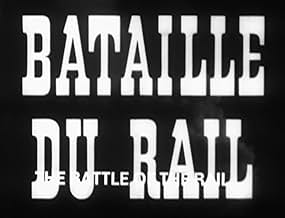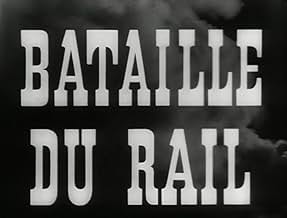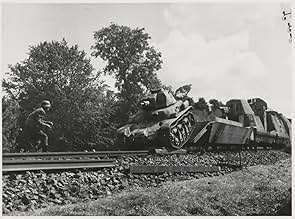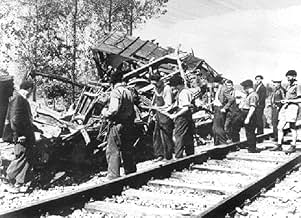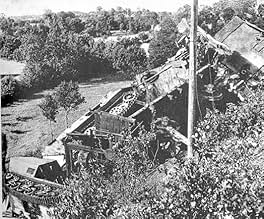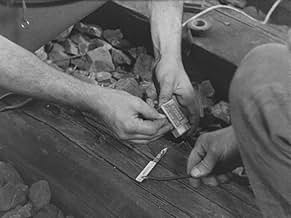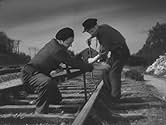IMDb-BEWERTUNG
7,0/10
1412
IHRE BEWERTUNG
Dieser Film ist eine Geschichte über die französischen Eisenbahnarbeiter, die während der deutschen Besatzung im Zweiten Weltkrieg Teil des organisierten Widerstands waren.Dieser Film ist eine Geschichte über die französischen Eisenbahnarbeiter, die während der deutschen Besatzung im Zweiten Weltkrieg Teil des organisierten Widerstands waren.Dieser Film ist eine Geschichte über die französischen Eisenbahnarbeiter, die während der deutschen Besatzung im Zweiten Weltkrieg Teil des organisierten Widerstands waren.
- Regie
- Drehbuch
- Hauptbesetzung
- Auszeichnungen
- 3 Gewinne & 1 Nominierung insgesamt
Marcel Barnault
- Cheminot
- (as Barnault)
Jean Clarieux
- Lampin
- (as Clarieux)
Jean Daurand
- Cheminot
- (as Daurand)
Lucien Desagneaux
- Athos
- (as Desagneaux)
François Joux
- Cheminot
- (as Joux)
Pierre Latour
- Cheminot
- (as Latour)
Robert Le Ray
- Chef de gare
- (as Leray)
Pierre Lozach
- Cheminot
- (as Lozach)
Pierre Mindaist
- Cheminot
- (as Mindaist)
Léon Pauléon
- Chef de gare St-André
- (as Pauleon)
Fernand Rauzéna
- Cheminot
- (as Rauzena)
Michel Salina
- Allemand
- (as Salina)
Charles Boyer
- Narrator
- (Synchronisation)
- (Nicht genannt)
Empfohlene Bewertungen
Although there have been more nuanced, psychologically penetrating filmic depictions of French resistance under Nazi occupation, none has matched the sheer immediacy of René Clément's feature film debut. It represents a natural progression from his pre-war documentaries and indeed the early part is filmed in a documentary style with no clear delineation of character but changes tack dramatically when news comes through of the Allied landings and the Maquis plan greater acts of sabotage to prevent the Germans from moving armoured trains to Normandy.
Based upon real events and featuring many of the courageous participants in the Battle of the Rails of 1944, Clément uses cinéma vérité techniques and Russian-style montage to build momentum and suspense, culminating in the unforgettable derailment of the train convey which is shot from three different angles. Suffice to say the film's most powerful scene is the execution by firing squad of six randomly chosen railway workers. This is a superlative combination of image and sound as their deaths are accompanied by trains whistling in defiance. The post-sync dubbing of the mainly non-professional cast is pretty good and this viewer at any rate is intrigued as to who supplied the German voices. Clément has also been sure to use the strongest, most characterful faces for the close-ups.
It seems that the French suffered from collective amnesia following the liberation and Clément made a brave call for his film might have come too soon and been too close to home but its triumphalism ensured its great critical and commercial success whilst arguably paving the way for Alexander Esway's hugely popular 'Le Bataillon du Ciel' the following year. One cannot help but wonder whether John Frankenheimer was aware of this film when making 'The Train' twenty years on.
As well as being a moving testament to the kind of bravery of which very few are capable it marks, on a purely filmic level, the emergence of a special directorial talent that was to go from strength to strength.
Based upon real events and featuring many of the courageous participants in the Battle of the Rails of 1944, Clément uses cinéma vérité techniques and Russian-style montage to build momentum and suspense, culminating in the unforgettable derailment of the train convey which is shot from three different angles. Suffice to say the film's most powerful scene is the execution by firing squad of six randomly chosen railway workers. This is a superlative combination of image and sound as their deaths are accompanied by trains whistling in defiance. The post-sync dubbing of the mainly non-professional cast is pretty good and this viewer at any rate is intrigued as to who supplied the German voices. Clément has also been sure to use the strongest, most characterful faces for the close-ups.
It seems that the French suffered from collective amnesia following the liberation and Clément made a brave call for his film might have come too soon and been too close to home but its triumphalism ensured its great critical and commercial success whilst arguably paving the way for Alexander Esway's hugely popular 'Le Bataillon du Ciel' the following year. One cannot help but wonder whether John Frankenheimer was aware of this film when making 'The Train' twenty years on.
As well as being a moving testament to the kind of bravery of which very few are capable it marks, on a purely filmic level, the emergence of a special directorial talent that was to go from strength to strength.
THE BATTLE OF THE RAILS is a rare little title that I managed to catch on Talking Pictures TV here in the UK in the first showing since 1960. It's a black and white drama about the efforts of the French Resistance to sabotage Nazi-controlled trains during WW2. The film is made with a documentary realism in which the action is narrated throughout. The photography is excellent and the pacing is fast. The film abandons typical conceits of characterisation and dialogue in favour of a focus on physical action, such as the sabotaging of tracks and trains and the subsequent derailments that follow. It's surprisingly tense, even thrilling at times.
I usually stop watching films when I discover that it has subtitles but I'm glad that I didn't with this one. Stopping German supplies and reinforcements reaching Normandy contributed greatly to the advancement of the Allies, many trains, and rail tracks, were destroyed by the RAF in the run up to the invasion but the events in this film also helped greatly.
After the war the French were very keen to show that they didn't just capitulate ASAP but had an active resistance movement but in the many WWII history books I've read their overall contribution to the victory In Europe is considered to be minimal.
Regardless of that this film is very well worth watching.
After the war the French were very keen to show that they didn't just capitulate ASAP but had an active resistance movement but in the many WWII history books I've read their overall contribution to the victory In Europe is considered to be minimal.
Regardless of that this film is very well worth watching.
René Clément directed this exceptional film which captures an important but often ignored part of the Allied war effort in WWII. It chronicles the efforts by the French railway workers to hinder the German war machine. What makes the film work wonderfully is the non-professional actors--like the Neo-realist actors in post-war Italian films (such as by DeSica and Rossellini). This gives the movie a great sense of realism--almost like a documentary that was somehow filmed as events really took place--though it was made just after the war.
The film begins sometime after the German occupation began--it's never exactly certain. During this time, random acts of sabotage occur but they are mostly annoying and are seemingly unorganized. However, partway through the film, the Resistance receives word that the Normandy invasion has occurred. Suddenly, the full extent of the French Resistance is obvious, as the entire effort to use the rails to reinforce the German army are frustrated in many, many ways--ranging from sabotaging the tracks and equipment to even attacks on the trains themselves by partisans.
"La Bataille du Rail" ("The Battle of the Rails") works very well--mostly because in addition to the non-actors working in the film, the director and writers (one of which was the director himself) used a lot of tense little vignettes in the film to draw in the viewer. Perhaps some today might find it all a bit boring (after all, they are more interested, perhaps, in seeing the newest Brandon Frazier film), but as a history teacher, I think it's a must-see! Wonderful.
By the way, you can't blame the film makers for this, but the print I saw was pretty shabby. It had a lot of scratches and the white captions were poor--blending into the scenes at times and also, occasionally, mistranslated or using jargon that is too technical (full of railroad terms and jargon). I would LOVE to see this film restored and re-captioned!
The film begins sometime after the German occupation began--it's never exactly certain. During this time, random acts of sabotage occur but they are mostly annoying and are seemingly unorganized. However, partway through the film, the Resistance receives word that the Normandy invasion has occurred. Suddenly, the full extent of the French Resistance is obvious, as the entire effort to use the rails to reinforce the German army are frustrated in many, many ways--ranging from sabotaging the tracks and equipment to even attacks on the trains themselves by partisans.
"La Bataille du Rail" ("The Battle of the Rails") works very well--mostly because in addition to the non-actors working in the film, the director and writers (one of which was the director himself) used a lot of tense little vignettes in the film to draw in the viewer. Perhaps some today might find it all a bit boring (after all, they are more interested, perhaps, in seeing the newest Brandon Frazier film), but as a history teacher, I think it's a must-see! Wonderful.
By the way, you can't blame the film makers for this, but the print I saw was pretty shabby. It had a lot of scratches and the white captions were poor--blending into the scenes at times and also, occasionally, mistranslated or using jargon that is too technical (full of railroad terms and jargon). I would LOVE to see this film restored and re-captioned!
This movie is not great. It's good, and it's only ok if you've already seen The Train 1964. This 1946 movie is artistic, stark, neo realist, blah blah, like many post war European made movies from the era. But it lacks character study and has only tactical measures and rebelliousness against not-so-evil Nazis as the reason for being, unlike The Train.
Army of Shadows 1969 is another example of a refined, not-so-purist remake of previous movies. It was just done better and had a longer lasting impact, like The Train.
But telling fans of La Bataille Du Rail that it's overrated just gets a lot of dislikes. Examine both movies yourself, but make sure you watch the 1946 movie FIRST so you won't be disappointed.
Army of Shadows 1969 is another example of a refined, not-so-purist remake of previous movies. It was just done better and had a longer lasting impact, like The Train.
But telling fans of La Bataille Du Rail that it's overrated just gets a lot of dislikes. Examine both movies yourself, but make sure you watch the 1946 movie FIRST so you won't be disappointed.
Wusstest du schon
- WissenswertesIn part financed by what had been the Resistance as a way of showing international audiences what the French population had been facing under Nazi oppression. The Resistance was also keen to let the world know that they had been actively involved in disrupting the German war machine in France as the international perception at the time was that the French had capitulated and collaborated a little too easily with their Nazi captors.
- PatzerRailway worker tapping Morse code just repeats letter "V" most of the time with only a few exceptions.
- Crazy Credits(in cast) et Les cheminots de France
- VerbindungenFeatured in Cannes... les 400 coups (1997)
Top-Auswahl
Melde dich zum Bewerten an und greife auf die Watchlist für personalisierte Empfehlungen zu.
- How long is The Battle of the Rails?Powered by Alexa
Details
- Erscheinungsdatum
- Herkunftsland
- Offizielle Standorte
- Sprachen
- Auch bekannt als
- Die Schienenschlacht
- Drehorte
- Gare SNCF, Saint-Brieuc, Côtes-d'Armor, Frankreich(first scenes, train station)
- Produktionsfirmen
- Weitere beteiligte Unternehmen bei IMDbPro anzeigen
- Laufzeit
- 1 Std. 25 Min.(85 min)
- Farbe
- Sound-Mix
- Seitenverhältnis
- 1.37 : 1
Zu dieser Seite beitragen
Bearbeitung vorschlagen oder fehlenden Inhalt hinzufügen

